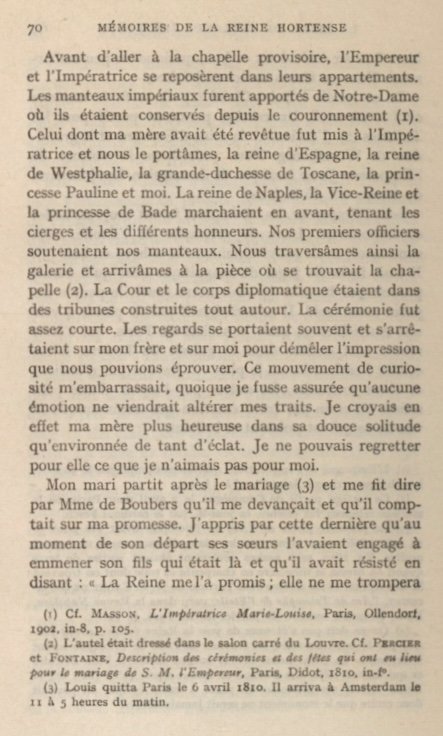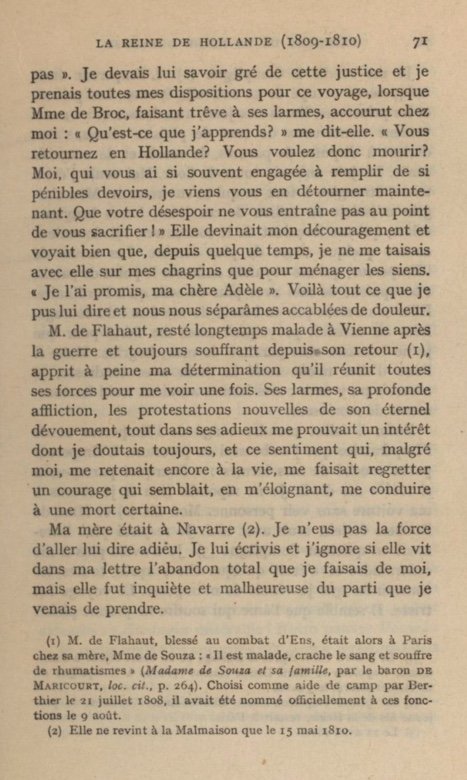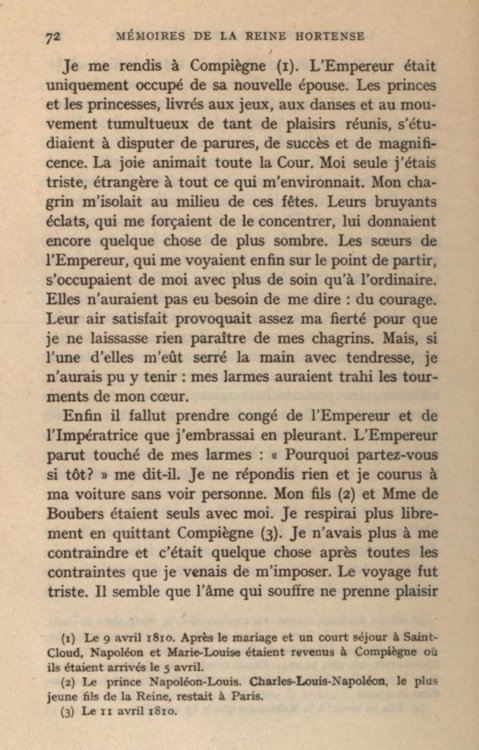Let’s have another look at Hortense’s Memoirs. If you want to read the book it is available for free at the side bar in English and French. Use the widget on the sidebar to translate the text below into pretty much any language.
Hortense describes her state of mind as she returns to a domestic situation she feels will kill her. Napoleon continues to be subverted by courtiers on the occasion of his second marriage.
Hortense’s memoirs continues:
He could not grasp that after all my vain attempts, which only I knew about, I had no health, strength, or hope left to enable me to try again. Thus, sunk in a state of dull discouragement, haunted by the constantly recurring idea that no one, not even those I was fondest of, cared what became of me, I finally gave my consent to this departure, which so many people desired.
I prepared to return to the spot where I had suffered so much, as a condemned man goes forward to his doom. My brother, who finally became uneasy when I ceased to make any objection to what was proposed, wished himself to establish the conditions under which I was to return to Holland.
It was agreed that I was to live under the same roof as my husband; he was to allow me to visit health resorts whenever necessary I was to be permitted to choose my own attendants, for none of my French ladies in waiting could accompany me. I obtained permission to leave my youngest child in Paris on account of
his delicate constitution, and I made my preparations to leave immediately after the wedding, taking Madame de Boubers and Monsieur de Marmol with me.
My domestic troubles interested no one except myself. The entire court was taken up with the prospect of the coming festivities and the Empress's arrival. Many discussions took place between the kings and the princesses in regard to the proper ceremonial to be observed on her arrival.
I sometimes smiled to see so much importance being attached to matters which to me appeared to have so little importance. A heart that suffers realizes the futility of all material things. No decision had yet been arrived at, when the Emperor acted in a way of which everyone approved.
He left one morning in a barouche accompanied only by the King of Naples to drive out to meet the Empress. The meeting took place near Noyon. The Emperor stopped his carriage, stepped directly into that in which the Empress was seated and embraced her tenderly.
The Queen of Naples was with them. At seven o'clock in the evening we all took our places in full court dress at the bottom of the grand stairway to welcome the newcomer. We kissed her in turn, but hardly had a chance to do more than catch a glimpse of her as she passed.
After going through the gallery where all the local authorities and the court were assembled, she disappeared, and we did not see her again until the next morning.
She received us cordially. Her manner was gentle and kindly, although somewhat embarrassed. We were all pleased with her appearance.
The court then went to Saint Cloud, where the civil marriage took place on April 1.
A stately procession proceeded from there to the Tuileries. I was with the Queen of Spain and the Grand Duke of Württemberg. We preceded the Emperor's carriage. I shall not describe the scene. The contemporary newspapers have probably done so.
During the Empire the public ceremonies were always impressive and beautiful. The Arc de Triomphe de l’Etoile, already begun, had provisionally been completed in wood.
It was easy to imagine the magnificent effect it would later have produced. Along the way the crowds seemed to me rather reserved. The common people did not display much pleasure at seeing an Austrian woman again on the throne.
On the other hand Paris society, which had mustered in full force in the gallery of the Louvre, gave way to the most lively enthusiasm, some of its number because they recalled old and dear memories, others because they hoped the marriage would insure a lasting peace, or because they were stirred by that emotion which any spectacular and brilliant sight can arouse.
Before proceeding to the temporary chapel, the Emperor and Empress rested in their apartments. The imperial mantles were brought from Notre Dame where they had been kept since the coronation.
The Empress put on the one which my mother had worn, and the Queen of Spain, the Queen of Westphalia, the Grand Duchess of Tuscany, the Princess Pauline and I carried the train. The Queen of Naples, the wife of the Viceroy of Italy, and the Princess of Baden marched ahead bearing the candles and different insignia.
In this order we passed through the gallery and arrived at the room which had been arranged as a temporary chapel.
The court and the diplomatic corps were in stands erected around the walls. The ceremony was rather short. The spectators frequently glanced at my brother and me, trying to see what our impression was.
This movement of curiosity embarrassed me although I knew that no emotion would betray itself on my features. Indeed, I sincerely believed that my mother was happier in her quiet retreat than surrounded with all this pomp.
I could not regret for her sake what I personally did not envy. My husband left after the marriage, sending me word by Madame de Boubers that he was preceding me but that he counted on my keeping my promise.
Madame de Boubers told me that as he was going away his sisters had tried to persuade him to take his son, who happened to be present, with him, but that he had refused, saying: "The Queen has given me her promise. She will not break it."
I was grateful to him for this token of confidence. While I was making my final preparation for my journey, Madame de Broc, overcoming her own grief, hurried to see me. "What is this I hear?" she exclaimed. "You are going back to Holland? Do you want to die? I who so often urged you to fulfil your duties no matter how disagreeable they might be, I now implore you to relinquish all such ideas. Do not let your despair lead you to sacrifice yourself to such an extent."
She guessed how discouraged I was and knew that for some time I had not been telling her my troubles in order not to add to hers.
“I have given my promise, my dear Adele." This was all I could say and we separated overwhelmed with grief.
Monsieur de Flahaut had been ill in Vienna after the war for a long time. He was still far from well since his return and made a great effort in order to come to see me as soon as he heard what I intended to do.
His tears, his profound distress, his renewed declarations of eternal devotion, everything about the way in which he bade me farewell betrayed a depth of feeling which I still refused to admit, and this affection in spite of myself made me still cling to life and regret my courage, since the latter, which enabled me to leave Paris, at the same time hastened a certain and speedy death.
My mother was at Navarre. I did not have the strength to go and see her. I wrote her. I cannot tell whether in my letter she felt how completely I was surrendering myself to my fate, but she was unhappy and uneasy over the decision I had made.
I went to Compiègne. The Emperor was utterly absorbed by his new wife. The princes and princesses, yielding to the appeal of amusements, dances, and all those tumultuous pleasures which found expression there, spent their time trying to outshine one another in popularity, magnificence, and pomp. The whole court was making merry.
I alone was sad, an alien to all my surroundings. My wretchedness made me stand aside in the midst of all these festivities. Their noise and sparkle only rendered my misery more acute and deepened its somber glow.
The Emperor's sisters, now that I was at last on the point of going away, took more pains to make themselves agreeable to me than they generally did.
They did not need actually to say to me: "Be brave." Their highly satisfied air was sufficient to prevent my pride from giving any sign of my distress. But if one of them had gone so far as to press my hand affectionately, I should not have been able to stand it, and my tears would have betrayed my hidden anguish.
At last it was necessary to bid the Emperor and Empress farewell. I wept as I did so. The Emperor seemed touched by the sight of my tears. "Why are you leaving so soon?" he inquired.
I did not reply and hurried to my carriage without seeing anybody. My son and Madame de Boubers were my only companions. As we left Compiegne I breathed more freely. I had no longer to curb my emotions, and this was a relief after all the disagreeable things I had lately been forcing myself to do.
The original French is available below:







